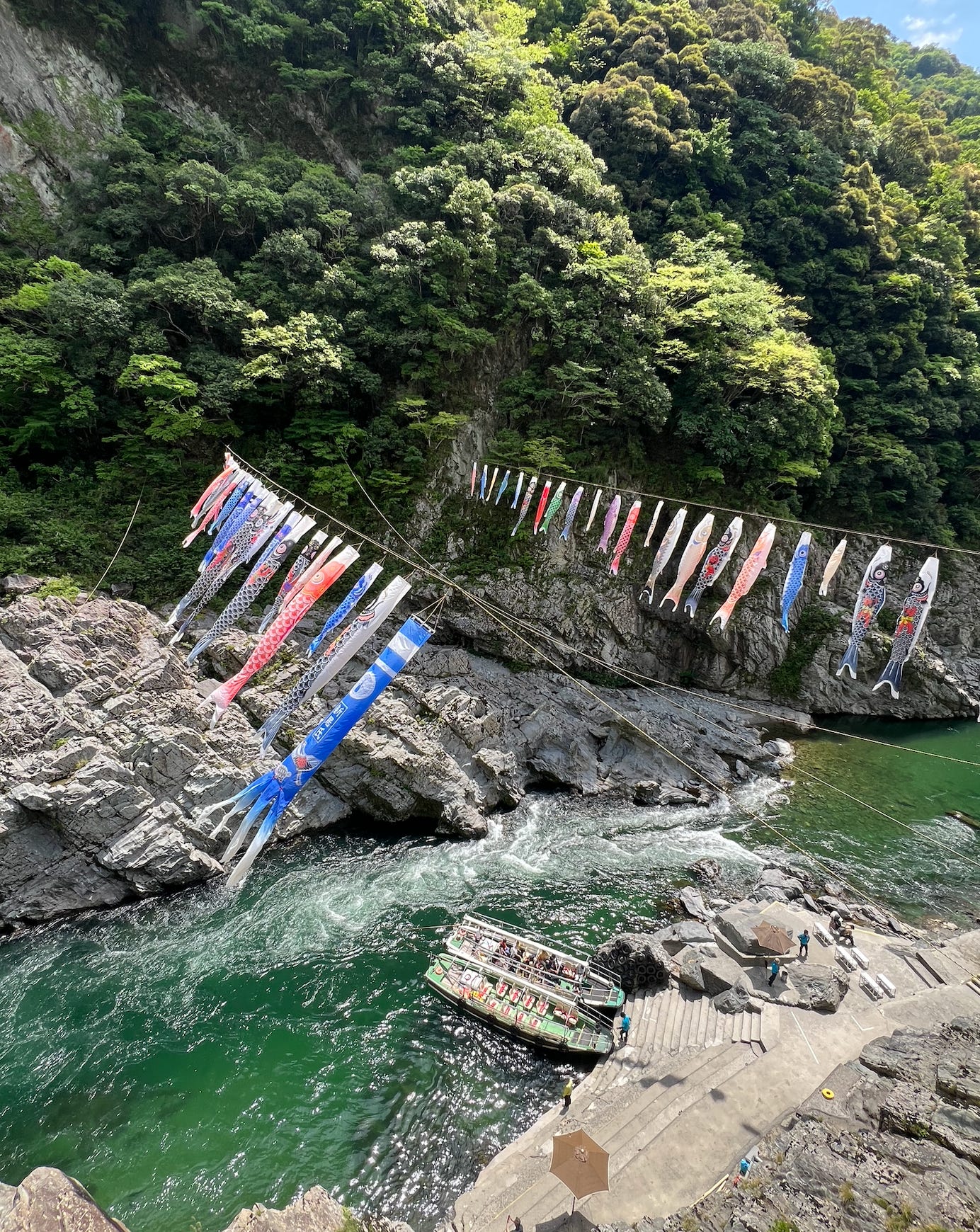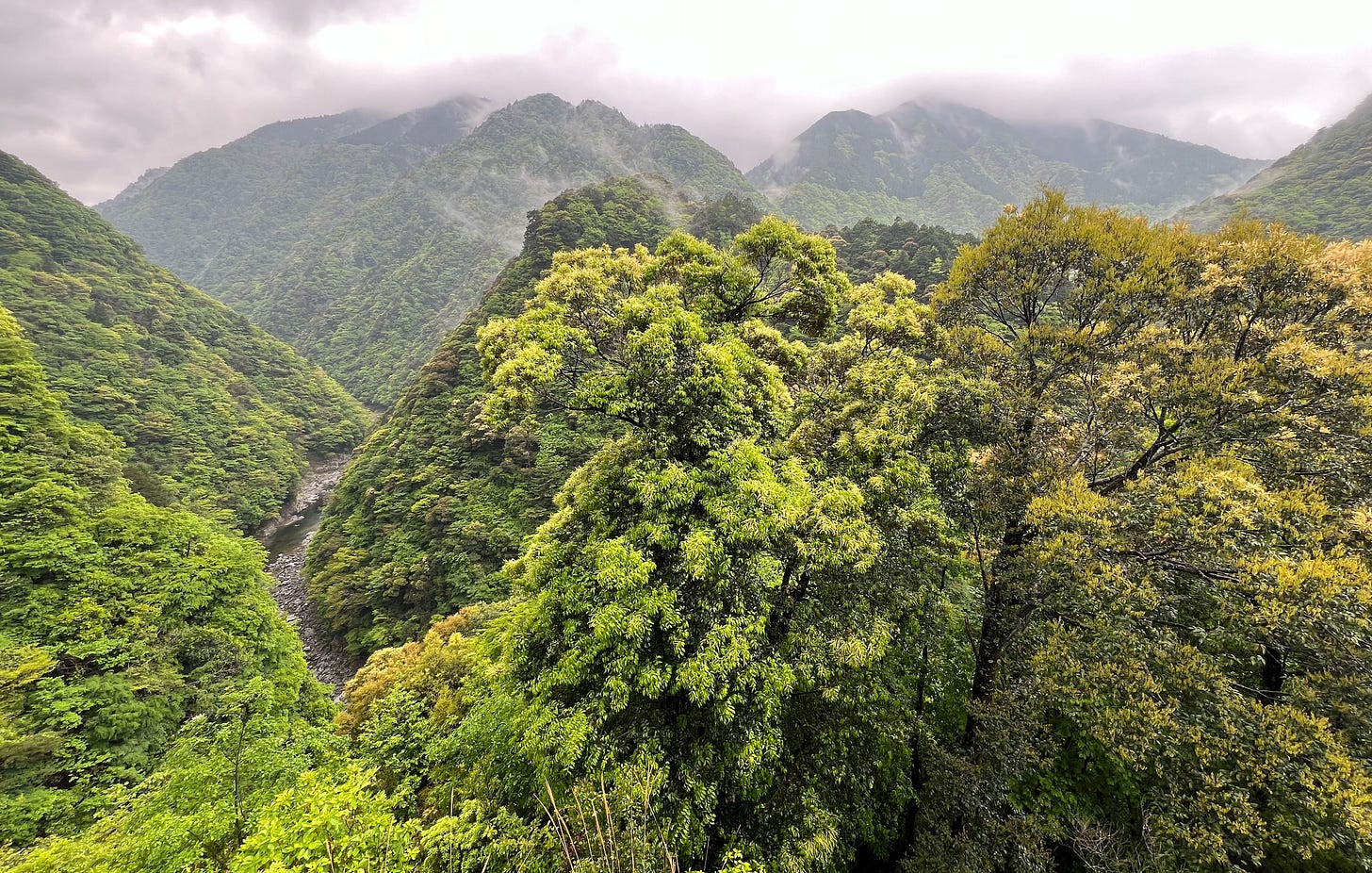Inside a Japanese village on the brink of disappearance
The surreally beautiful, vanishing towns of Miyoshi
We had almost reached the shrine, deep in the Miyoshi mountains, when Tetsuya pulled the car off to the side of the road.
“We’ll stop here for a moment,” he said. “I want to show you something.”
I opened the door and stepped into the mizzle. I’d been in the area for a couple of days already, but I was still overwhelmed by how green everything was. There were tree-covered mountains below, and tree-covered mountains above, blocking out the sky.
Tetsuya wordlessly offered me his umbrella, I shook my head.
“This is a raincoat,” I said, gesturing at the jacket I was wearing.
Tetsuya walked closely to me anyway, protecting both of our heads from the misting rain.
We crossed the road and leant on a fence overlooking a chasm, where a river rushed dozens of metres below. A large concrete building clung to the ledge on the other side of the water. Plants had started to poke through cracks in the building.
“This is my old school,” Tetsuya said. “It’s closed now.”
He pointed at a smaller building attached to the main structure.
“That’s where I would stay during the week. It’s like a school hotel. It was hard to pick me up and drop me off everyday. So some students would have to sleep there.”
“How does it make you feel looking at it now?” I asked.
Tetsuya was quiet for a moment.
“It makes me feel sad,” he eventually answered. “It's like looking at the end of my childhood.”
The sound of the rain hitting the umbrella got louder. Wordlessly, we both walked back to the car and drove away. The concrete building was soon out of view as we turned a corner and penetrated deeper into the mountains.
There’s a famous Japanese novelist, Yukio Mishima, whose incredible death (suicide by seppuku after a failed coup) often overshadows his numerous, lauded works. Mishima covered a lot of themes, but he seemed to ruminate a lot on beauty and its transient nature. His works, I think, obliquely argued that beauty is at its most pure, its most intense right before its destruction.
“When people concentrate on the idea of beauty, they are, without realising it, confronted with the darkest thoughts that exist in this world. That, I suppose, is how human beings are made,” Mishima once wrote.
This is certainly how I felt staying in Miyoshi. Here is a place of oppressive beauty. Towering mountains fold into narrow gorges, where crystalline rivers roar and towns cling to the rockface like limpets.
But the very qualities which make Miyoshi so compelling – its remoteness, its inhospitable beauty – are also the reason people are choosing not to live there. The last generation of children to grow up in the area, now adults, have long since left. They’ve moved to the city for jobs, shops and easier lives in offices.
What remains are towns filled with the elderly, stubbornly holding onto a way of life that stretches back generations. In another decade or two, much of the area will likely be abandoned. As the people depart, so too will their customs and legends.
To be amongst the last visitors to experience this culture is a privilege and a tragedy. Its transcendent beauty is covered in a funeral shroud. A hundred times a day, I feel my heart swell and drop.
I’d taken a gamble staying in Miyoshi. I’d found my accommodation on a local bed and breakfast website targeted towards Japanese travellers. There were no reviews, just scenic pictures of a traditional building on the top of a mountain. A few days before I was due to arrive, I’d received a flurry of anxious messages from the website administrators, warning me that the hosts had no English, the drive would be treacherous, and that I’d be served locally-hunted game. None of this deterred me.
The guest house was at the end of a single-lane road which zigzagged up the side of a mountain. For much of the white-knuckle, twenty minute drive, there was a precipitous drop on one side. I noticed there were no guard rails or protections to stop a car from rolling down the mountain like a log.
I was being hosted by the Hirata family and Miyoko, a small, lean woman who is the matriarch, met me as I drove into their driveway.
“Otsukaresama deshita,” she said as I stepped out of the car. It’s a phrase that loosely means, ‘thanks for your hard work’, or ‘good job’. These are perfunctory, polite words. But I felt like I’d earnt them.
As I was warned, Miyoko didn’t speak any English, and my Japanese is preliminary at best. But somehow, with the help of a phone translation app, we managed to communicate well enough. I liked Miyoko very quickly. She was warm, excitable, and generous with her local knowledge.
Here was a woman who was proud of her home, and proud of her life. She had much to share, and I was a grateful recipient.
Dinner is usually served inside the guest’s room, but Miyoko soon had my measure and invited me to eat downstairs with her family. She told me that her husband and son, Tetsuya, would be joining us. I was grateful for the company.
Miyoko had made a large, extravagant meal. Everything, except for the rice, she explained, had come off the land. We ate the deer who had trampled her gardens and the boar who had plundered their vegetables. A small amount of shiitake mushrooms were served on a plate. The monkeys, I was told, had gotten into the rest.
It’s hard to imagine a more inhospitable place for farming – but the soil at Miyoshi is rich and grows spectacular food if you’re good at managing the land. The main local industry, however, is green tea. Narrow, lush fields of leafy plants dot the mountainside from the bottom of the gorge to the top.
But tea farming is dependent on a functional factory. It’s only operational on a seasonal basis, and there are barely enough people to keep it running.
“It should take about 17 people to run the factory,” Tetsuya says at dinner. “At the moment, there are about seven. And all the workers are older.”
It’s also a physical job. I look at Miyoko’s husband. He is a robust-looking man; clear-eyed and fit. But he’s approaching 80 and the days at the tea factory are long.
“How many people are left in the area?” I asked.
Miyoko squinted her eyes and thought for a moment before answering.
“About 60 or 70 between here and the next mountain,” she said.
But that number shrinks every year as people die or are forced into care. I wonder how many more years the tea factory will run.
Tetsuya offers, then, to show me around the town the next day. It’s a kind proposition which, in the Japanese way, is framed in a manner which makes Tetsuya sound like the beneficiary.
“It will help me very much with my English,” he says.
The next day, after an impromptu stop at Tetsuya’s school, we drive to Kenmi Shrine, a place that’s said to banish demons. There are no straight lines or easy roads in Miyoshi. We wind through the mountains like slalom skiers, often having to stop and reverse back down the road to let other cars pass.
Tetsuya and I converse using a mix of English and Japanese, choosing simple words and sentences to get our meanings across. Speaking in Japanese makes me more open and sincere – being coy is a luxury available only to those with good vocabularies.
Perhaps it’s the same for Tetsuya, who speaks frankly about his life. Though we’re around the same age, our lives are starkly different. Tetsuya tells me that he, his wife, and his three sons all live with his mother in law. It’s noisy, he tells me, and a bit chaotic. Tetsuya spends his life in service to his family, their goals and ambitions.
Tetsuya works hard on his English, taking lessons when he can, and would love to visit Australia. He concedes, though, this won’t be for a while.
“It is hard to have dreams when you have children,” he tells me.
There’s nothing self-pitying about this revelation. There are just the words of a busy man pulled in too many directions.
“Do you want to come back to Miyoshi one day?” I ask.
He thinks for a moment.
“Yes, but it is hard. I can’t cook like my mother, so I can’t run the guest house. But I look at my father and see that he’s getting old…”
He trails off. There are no easy answers here.
The day that I leave, Miyoko and I sit for a while in her kitchen after eating breakfast together. Her son has returned home and her husband is back at the tea factory. He left so early I didn’t have a chance to say goodbye.
“I used to think these Mountains were lonely as a child,” she tells me. “But now I like them.”
“This is a very important, very special place,” I say. “Thank you for having me.”
She blinks a couple of times, her eyes watery. She nods.
We both look out the window for a while. Thick, cloud-like mist has formed and is swirling around the mountain peaks like water.
“One time when my son was very small, I got a call from his school teacher,” she says. “Tetsuya had told her he lived in a sea of clouds.”
Miyoko clutches her heart and closes her eyes.
“We both thought that was so beautiful.”
I can’t stay too late. The car needs to be dropped off on the other side of the island, a few hours’ drive away.
“This isn’t goodbye forever,” I say. “Just goodbye for now”.
I watch in the rear view mirror as she waves until I’m out of sight.
Once again, Miyoko is alone.







I'm currently dreaming about going on a trip to Japan. This was so lovely to think about the remote places to experience. What inspired you to go to Miyoshi?
Such beautiful writing. You really painted the picture and transported all of us to that mountain town, without the harrowing drive up the winding road. I hope more people see this and visit!